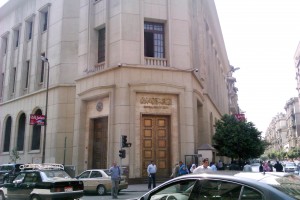
(Abdelazim Saafan/DNE Photo)
By Farah Atia
The Central Bank of Egypt is cutting down the amount that banks are able to invest from their tier 1 capital in the local money market from 5% to only 2%.
“It seems like a random decision,” said Yousef Kamel, fixed income analyst at Rasmala. “The regulator of money market funds is the Egyptian Financial Supervisory Authority (EFSA), not the Central Bank of Egypt. EFSA is the regulator of asset managers who will be directly impacted by this decision. Still, there is a good side to this decision. The Central Bank will be playing its role as the regulator by ensuring the balance sheets of banks are safe and sound and the tier 1 capital is adequate.”
The local money market industry comprises eight local financial institutions that provide money market funds, with a total asset base of nearly EGP 70bn.
The total amount of funds that banks are able to invest in all money market and fixed income funds has also been limited to 7.5% of a bank’s local currency deposits.
Banks will have to cut down their funds to the imposed percentages before issuing any new short-term money market certificates.
It is predicted that Beltone Capital will bear the biggest losses, being the biggest player in the market. By the end of 2012, the company was managing EGP 32bn, the majority in the form of money market and fixed income funds. The company is currently managing a total of EGP 25bn EGP worth of assets.
According to Kamel, the 7.5% limit is estimated to result in outflows of EGP 12bn pounds from money market and fixed income funds. “This isn’t going to be a run on money market funds; this money will move out gradually,” he explained. “This will happen through refund operations till the limit is reached. A lot of companies will be harmed cutting money market funds’ revenues by as much as 50%”.
Unlike privately operated money-market funds, fund managers are assuming state-owned banks will not be harmed. “The National Bank of Egypt, on the other hand, holds the biggest deposit base,” Kamel pointed out. “7.5% of deposits will still make up a much bigger amount than what the bank can actually sell in the form of money market certificates. They can continue to market their funds without damage.”
According to the Central Bank of Egypt, over EGP 20m of money market and fixed income funds belong to Banque Misr, one of the Egyptian state-owned banks. The bank has been named the “Best Provider of Money Market Funds in Middle East” for the years 2008 and 2012 by Global Finance.
Nearly all money market fund investments are used to buy high-interest bearing government securities, leading some fund managers to worry that the central bank is looking to reduce government interest rates by directing people towards placing deposits at commercial banks instead of investing in money market funds. Lending to the government was a big source of income for commercial banks. The budget deficit, currently at 11.5% of GDP, has pushed the Egyptian government to borrow from local banks.
Other fund managers continue to see this regulation as completely unjustified. “There are no obvious reasons for why the central bank is imposing this limitation,” Kamel said. “Removing key contributors to the money market will do no good. The decree is largely vague.”




